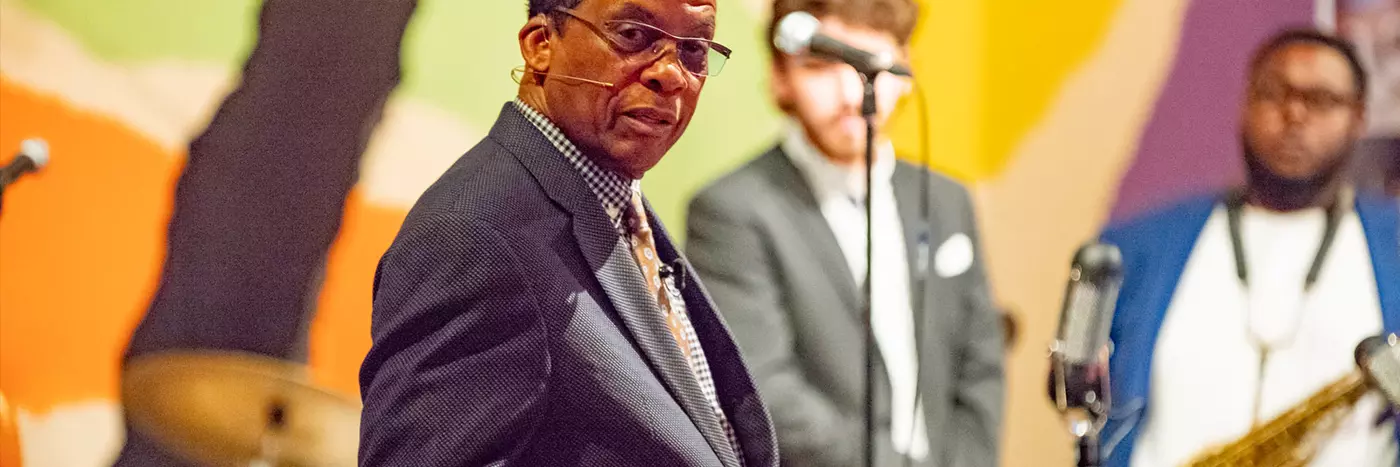Herbie Hancock plays jazz for a more peaceful world
How one mistake with Miles Davis became a lesson for life
When Herbie Hancock played at the UNESCO building in Paris, no one expected kids to be banging at their doors to get into a philosophy conference – even the pompiers, the firemen, were summoned. It was Mika Shino, the director of International Jazz Day, that brought the worlds of philosophy and jazz together.
As a longtime friend and advisor to Herbie and a songwriter in a past life, she left the stifling music industry of the ‘90s to chase something more. Shino’s connections to the industry became handy, and led her to work with UNESCO on a concert – and eventually an international holiday – that brought the principles of democracy, freedom and jazz together.
On International Jazz Day Shino, Herbie Hancock and the Hancock Institute teamed up with trumpeter James Morrison for a jazz bootcamp and masterclass at the Sydney Opera House. Speaking to Backstage, Shino shared stories about the legendary Miles Davis, Herbie’s legacy in music, and the liberating power of jazz in a time of political intolerance.
Historically, jazz has been the language of resistance. And, for a lot of people of colour, it still is. Have you seen a connection between jazz and politics?
Jazz comes from a place where you’ve had a group of extremely oppressed people, slaves who didn't have any other forms of expression. They got together in Congo Square and they were able to manage their frustrations and their suffering through music. It created this musical language that's now universal.
Throughout history, it has given a voice to freedom movements and empowered dissidents – you’ve seen it in civil rights movements in former Soviet Union and in South Africa. It speaks to the oppressed, the people who don't have a voice. And it unites people to the fact that you have this realm that’s safe, where people can express themselves, be heard and respected and listened to.
Herbie often says how jazz is not just about this beautiful music that everybody can tune into as music that people can resonate with; it's also a way for musicians, individuals, to express themselves with absolute freedom – improvisation. It's a way for them to just be themselves.
But in order for an artist to be themselves and to be heard, they need to be willing to listen and to into respect what's being expressed. And then in turn doing it to the other musicians, giving them that respective of being heard.
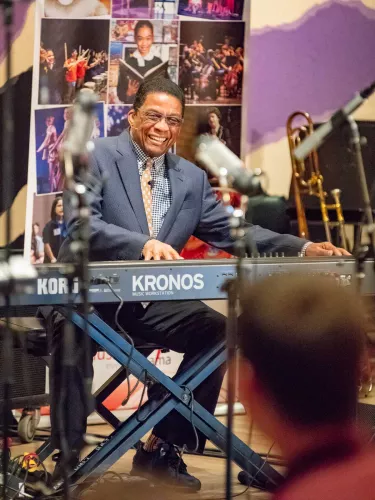
He didn't understand for years what had happened; it was only later on that he realized the reason why Miles was able to make something beautiful out of his mistake was because he didn't judge him.
Herbie has a beautiful anecdote when he was a very young musician and he started playing with Miles Davis. He said one of the first gigs that he had, it was a great night and it was a great club and a great ambience and all the band members did incredible solos. Miles had just done a solo. It was Herbie’s turn, he's probably 18-19, and he just went for it and hit some notes. And it was, to him, completely wrong. He said he completely messed up.
But he just had to continue. He got all hot and started sweating and there was nothing he could do. He started on the wrong note and he just said, “oh my god I have to finish this solo”. He just wanted to crawl under the piano he was so embarrassed that he made such a mess out of such a beautiful moment.
When he was done with the solo, Miles looked at him, he took a breath, and he played a note, a note that made his terrible note sound right. Isn't that beautiful?
He didn't understand for years what had happened; it was only later on that he realized the reason why Miles was able to make something beautiful out of his mistake was because he didn't judge him. He just took what he did as an occurrence, like “this happened”, and it's not this "mistake" happened, but this sound happened. Now what are you going to do about it?
It was Miles' responsibility to make that into this, fit into that ensemble that beautiful evening when that beautiful moment that was happening. It's such a beautiful example of what jazz is.
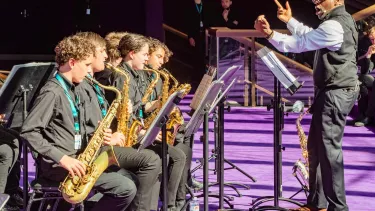
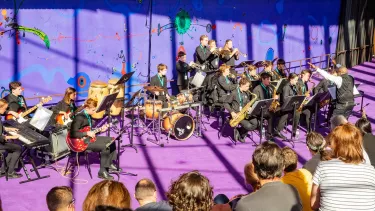
Through music, UNESCO aims to promote ‘independent thinking’ and ‘freedom of expression’. How can artists carry this spirit through to new music and new art, that spirit of improvisation – and not just in jazz?
They're going to struggle because of the tendency for people to just play the classics and play the songbook, the jazz canon. It’s important, but it is scary for people to step out there.
What Esperanza Spalding is doing is really courageous. She could have just stayed doing what she did when she got her Grammys, but with every single album she stepped into completely new territory and expressing what she wanted musically, but also visually and performance-wise. Her last tour, the 12 Little Spells tour, was a performing art piece with dance and visual installations.
For a lot of artists it's really difficult because the industry doesn't really allow you to experiment; it's not safe in terms of sales. But as an artist you’re exposing yourself, you're putting yourself out there for criticism and trying to win over new audiences all the time. Even within jazz, there's a sort of elitism or judgment towards completely new sounds and approaches.
There's a tendency for older communities to say, “well that's not really jazz, that's not pure jazz”, if it's mixed with hip-hop or alternative rock. And Herbie has been an example – he never judges. He encourages young people to experiment and try new things just like he always has. And he only surrounds himself with creative young people that he can be inspired from.
What is the place of jazz in politics today? It’s always been a force that has cut through the oppressor. Does it still have the power to cut through today?
Absolutely. The art form itself is a form of resistance. It is a struggle to combat, it retaliates against oppression, against any kind of conformism, any kind of intolerance. Especially in the United States, it's the real sense of political resistance and uprising, and expressing it through this artform; the artists are very very conscious of that. Hopefully it can resonate throughout other communities.
The rise in extremism and intolerance, it's a saddening situation, and I think the artistic community has been very active in trying to work against it. In hip-hop and in jazz, there’s a very obvious move towards resistance and a collective understanding that there needs to be change.
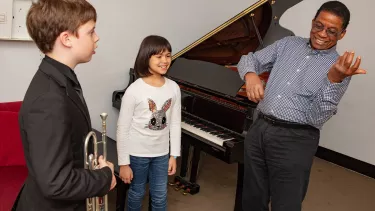
Jazz says, I dare you to take a risk, I dare you make that sound. It’s daring yourself to see something else or sound like something else or try something else.
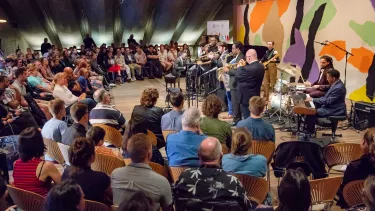
There’s such a fanatical jazz scene in Japan, and a lot of the fans I’ve talked to there say they love jazz because of its freedom and experimentation – the feeling of lifting themselves out of routine and into a bigger world.
For me Japan is almost unbearable, the conformity and the rigour of being a Japanese citizen in Japan. The family duties, the community obligations and societal burden. It’s a very heavy place to live. If you have an unusual dance form, or art form, you'll definitely find a group of people in Japan who will know all about it. People love artists like Ushio [Shinohara], who lives in New York now, because he dared to go out of the comfort zone.
That's what it is with jazz too. Wayne Shorter always says jazz is about saying, “I dare you”. That's all it is. Jazz says, I dare you to take a risk, I dare you make that sound, I dare you to blow this horn in one way and not the other. It’s daring yourself to see something else or sound like something else or try something else. I think that's really what inspires people in Japan – I think they they really understand it profoundly in that way.
The architect Frank Gehry quotes Wayne all the time. He would say, “Wayne Shorter says, you can't rehearse the unknown.” Wayne famously doesn't rehearse with his band anymore because he says, “How can you rehearse something that's unknown?” You're getting up there, with the quartet, and you're putting yourself out there in front of hundreds of people because you want to explore the unknown.
And that's true art to him; you're putting yourself out there, you're exploring it, with everybody else in front of you. So if you rehearse, to him it's almost like cheating.
You may also like
Shamrock Tenors
8 Oct 2025
Joined by a band of the country’s best multi-instrumentalists, the Tenors will light up the stage with soaring five-part harmony bringing a fresh energy to your favourite tunes.Take a journey to the Emerald Isle and enjoy classics like “Whiskey in the Jar,” “The Parting Glass,” “Wild Rover” and, of course, “Danny Boy.” Filled with Irish charm, stellar vocals, and electrifying performance, this Shamrock Tenors concert invites audiences to experience the music of Ireland like never before!
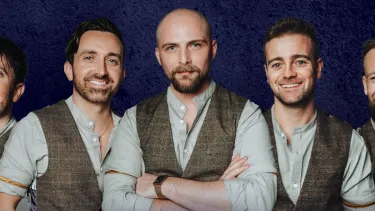
Gregory Porter
20 Oct 2025
Gregory Porter, the internationally acclaimed jazz and soul singer, is returning to Australia in 2025. He captivates audiences around the globe with his soulful baritone and deeply emotional performances with a voice that has been described as “liquid gold”. His unique blend of jazz, soul, and gospel has earned him critical acclaim and huge international success.

Konstantinos Argiros
27 – 30 Oct 2025
Don’t miss an unforgettable night with Greece’s renowned star Konstantinos Argiros, performing his greatest hits live. Greek superstar Konstantinos Argiros brings his electrifying live performance to the Sydney Opera House. Known for his soul-stirring voice and a repertoire filled with chart-topping hits, Argiros is one of Greece’s most celebrated artists. This special concert promises a captivating blend of emotive ballads, high-energy anthems, and stunning stage visuals.

